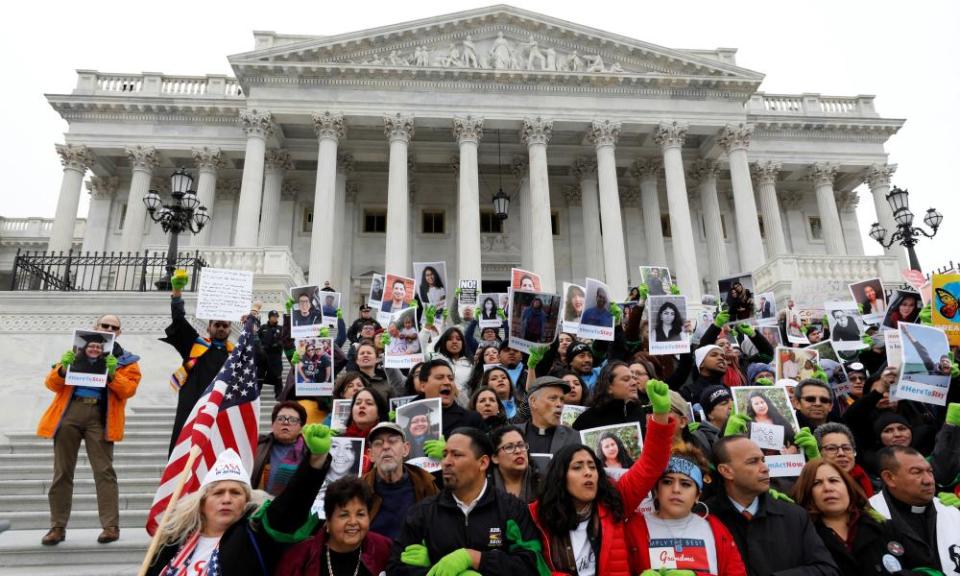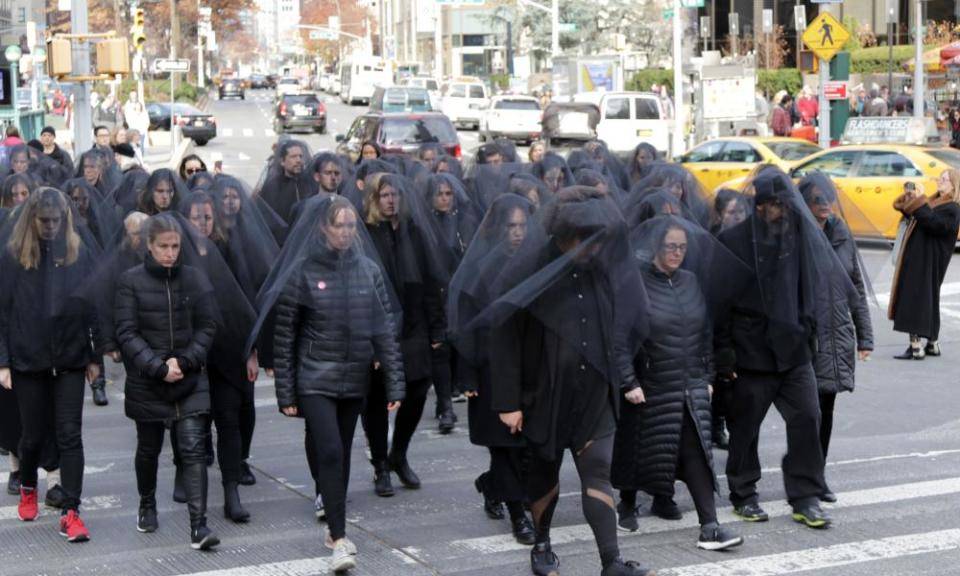The fight for the Dream Act is reaching its peak – but time is running out
The political will to protect the Dreamers is as strong as ever, activists say, but fears remain that hyperpartisanship will stall the fight for a ‘clean’ Dream Act

Osmar Abad Cruz likes to say his mom is the “original Dreamer”. In the early 1990s, she crossed the border from Mexico into the US to give her children a chance at a better life.
Nearly 25 years later, Abad Cruz, now 29, is living the life his mother wanted him to have. He graduated from college, works as a human resources director at a nonprofit and hopes to attend law school next year. This was possible in large part thanks to an Obama-era program known as Deferred Action for Childhood Arrivals, or Daca, which shielded nearly 800,000 young immigrants brought to the US as children from the threat of deportation.
Those children – many of whom are now adults – have become known as Dreamers.
“It was life-changing,” said Abad Cruz, who still lives and works in San Diego, where he grew up.
Dreamers are young immigrants who would qualify for the Deferred Action for Childhood Arrival (Daca) program, enacted under Barack Obama in 2012. Most people in the program entered the US as children and have lived in the US for years “undocumented”. Daca gave them temporary protection from deportation and work permits. Daca was only available to people younger than 31 on 15 June 2012, who arrived in the US before turning 16 and lived there continuously since June 2007. Most Dreamers are from Mexico, El Salvador, Guatemala and Honduras and the largest numbers live in California, Texas, Florida and New York. Donald Trump cancelled the program in September but has also said repeatedly he wants Congress to develop a program to “help” the population.
Abad Cruz’s future now hangs in the balance. In September, Trump announced that he was canceling the Daca program and gave Congress until March 2018 to find a legislative solution. Should lawmakers fail to come up with a replacement, Dreamers would find themselves exposed to deportation.
Democrats and some Republican lawmakers believe the next two weeks offer the best and perhaps only chance to enact legislation that would grant these young immigrants legal status. In return, congressional Republican leaders and the Trump administration want increased border security, tighter controls on immigration or both.
Abad Cruz is one of the many immigrants who worry that a bipartisan compromise might carry too high a personal cost: legal status at the expense of an increased risk of deportation for their undocumented friends and relatives who do not qualify for relief.
The concern is particularly acute for Dreamers whose families live along the US-Mexico border, where additional federal agents would likely be dispatched.
Activists are furiously lobbying Congress to pass a “clean” Dream Act, a bill first introduced in 2001 that would offer a pathway to citizenship for young immigrants brought to the US illegally as children. They are pressuring Democrats to reject any legislative proposals that would boost border enforcement, a demand that has become a sticking point in the fragile negotiations over the fate of the Dreamers.
“I cannot accept a ticket to the American Dream at the expense of my mom being deported,” Abad Cruz said.
“She cleaned offices for a living so we didn’t have to. She pushed us to become somebody. How can I turn my back on her and support something that has draconian immigration policies that will harm my community, my family?”
‘We are not political pawns’: the fight for a ‘clean’ Dream Act
In the next two weeks, Republicans, who control both chambers of Congress, must pass a bill to keep the government running and they cannot do it alone. Democrats have demanded that the measure include protections for Dreamers as the price for supporting a spending bill.
Republican leaders Mitch McConnell and Paul Ryan do not want to tie the issues together and argue that there is no urgency to address it before the March deadline. They argue that the plight of the Dreamers is a consequence of decades of bad immigration policy and a porous border.
I cannot accept a ticket to the American Dream at the expense of my mom being deported
Osmar Abad Cruz, Dreamer
Yet several Democrats have vowed to withhold their support if the measure does not include relief for the young immigrants, setting the stage for a potential government shutdown over the fate of Dreamers.
“We will not leave here without a Daca fix,” Nancy Pelosi, the House minority leader, pledged last week. Senator James Lankford, a Republican supporting a compromise immigration plan, replied wryly: Washington “is a beautiful place at Christmastime”.
“This myth that other groups of immigrants have to suffer in exchange for one group of immigrants is a non-starter for us,” said Adrian Reyna, director of membership for United We Dream and a Daca recipient. “We are not political pawns. You cannot use our lives to advance your political agenda.”
Yet Donald Trump fueled his presidential campaign with inflammatory rhetoric on immigration. As president, he faces pressure to deliver on his pledges to build a wall along the US southern border and deport immigrants living in the country illegally.

Though Trump has publicly expressed sympathy for Dreamers, his administration has repeatedly said a resolution is possible only in tandem with increased funding for border protection.
Christian Ramirez, the director of the Southern Borders Communities Coalition, said such demands for more enforcement do not match the reality along the southwest border with Mexico, where illegal border crossing have dropped to the lowest level in 46 years.
“Our goal is to have a conversation about border issues that isn’t politically charged and that isn’t about impossible ideas like building a wall from sea to shining sea,” said Ramirez, who spent last week on Capitol Hill meeting with lawmakers. “We don’t want to base policy on rhetoric. We want policy based on metrics and data.”
Time is running out: 122 Dreamers lose their protections daily
The demand to pass a “clean” Dream Act has divided those who support relief for the young immigrants.
“Don’t make it my way or the highway or it’ll be the highway,” said Daniel Garza, the executive director of the Libre Initiative, a Hispanic outreach organization funded by the conservative Koch brothers.
The political will to protect the Dreamers is a strong as it’s ever been, especially among Republicans, Garza said, but he worries that the tactics liberal activists’ are using to draw attention to the issue is “counterproductive”.
“We’re in a period of intense partisanship,” he said. “The goal should be to make this a simple and pain-free as possible – not to make unreasonable demands that won’t move the ball forward.”

In Washington, nearly 200 supporters were arrested last week, including two members of congress, during sit-ins on the steps of the Capitol and protests outside of congressional offices.
Around the country, their efforts were augmented by a coalition of business leaders, celebrities and religious organizations.
Polls show that Americans strongly support protections for Dreamers. Recently a number of Republican lawmakers joined Democrats in calling for a solution by the end of the year – but time is running out.
The goal should be to make this simple and pain-free – not to make unreasonable demands that won’t move the ball forward
Daniel Garza, Libre Initiative
As many as 22,000 recipients did not successfully apply for a renewal of their Daca status.
This means that with each passing day, according to the left-leaning Center for American Progress, roughly 122 Daca recipients lose their protections, including the authorization to work legally in the US.
Frank Sharry, the executive director of the immigrant advocacy group America’s Voice, expects that the final legislative proposal to protect Dreamers will inevitable include concessions to Republicans.
“Republicans can claim that they were able to fund immigration enforcement, because that’s what happens in a bill that provides resources for the rest of the fiscal year,” Sharry said. “Both can claim credit for passing the Dream Act and everybody can celebrate.”
But for some Dreamers, especially those whose families live along the border, victory would be bittersweet.
“At the end of the day,” Abad Cruz said, “I’d rather continue to fight than accept a benefit that would be unfair to my family.”
